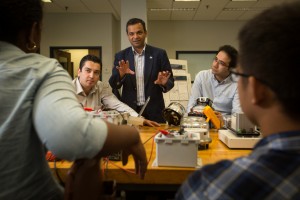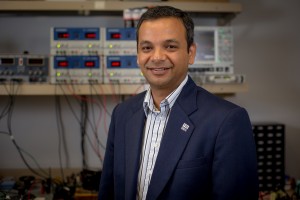
Title: Professor Sarwat to research solar facility installed at Engineering Center
Date: June 8, 2015
FIU has just received a first-of-its-kind renewable Photovoltaic (PV) Power Plant at its Engineering Center. Building on a relationship of more than 10 years with Florida Power & Light (FPL), Professor Arif Sarwat worked with FPL to establish the model site as part of a research project. The goal of this $7.65 million collaborative venture is to study and understand the potential impact of incorporating the clean energy source—one that is increasingly viewed as an important complement to fossil fuels and other non-renewable resources—into the existing power grid and evaluate the ramifications of such an integration in terms of reliability, power quality, efficiency and other power characteristics.
At the core of Sarwat’s work lies the issue of uncertain supply, or variability, a research problem he easily defines: “The existing smart grid is very reliable and stable one reason for which is the stable power plants that form the backbone. The PV Power Plants, due to their intermittent energy generation, pose questions about reliability and stability the electric grid system”
In anticipation of the $7 million solar panel installation completion in 2016, doctoral students in Sarwat’s Energy, Power & Sustainability Lab (eps.fiu.edu) have already spent a year examining historical data related to the state’s overall energy production and consumption, down to the detail of daily peaks and valleys. With FIU’s power plant in place, the group which already has access to multiple laboratories and datasets of FPL will have direct admittance to the work on the new solar numbers in a real-time fashion.
The team is already gathering enough momentum by understanding the problems in a realistic perspective and developing models that act fast and are dynamic enough to sustain the influx of the data that will inundate their terabyte-sized storage banks once the system goes live. This raw “data flood” will be channelized by cleaning, processing and crunching to yield useful information that will then be overlaid with a decade’s worth of weather data—climate being the key determining factor in solar energy production—to establish a predictive model of potential supply. This result, together with other related studies, will provide FPL with a framework for managing system wide integration of solar power on a large scale.

As part of the six-year $656,000 research grant awarded to Sarwat, who serves as the Principal Investigator, the team will also study changes in distribution planning due to high penetration of PV, assess the impact on reliability indices, perform location-based optimal PV placement study, investigate the integration of smart equipment and products, conduct big data modeling analysis and visualization, perform data quality assessment and checking, bad data weeding, data consistency and integrity enhancement and efficient data management and storage; and understand and expand the scope of cyber security in this regard.
Aside from the important scientific and societal contributions of the research, Sarwat, who has been instrumental in gathering funds to establish state-of-the-art equipment and infrastructure within the EPS Lab at FIU, explains the value of holistic development for those working under his direction. The relationship with FPL has made this possible, “exposing our students to many equipment’s, technologies and processes that they would never see in a university setup”. With a strong internship program at the utility, and on-hand laboratory environment that bridges the gap between academia and the industry; both his undergraduate and graduate students are in high demand. He adds, “Almost everyone from my lab is hired before they graduate.”
